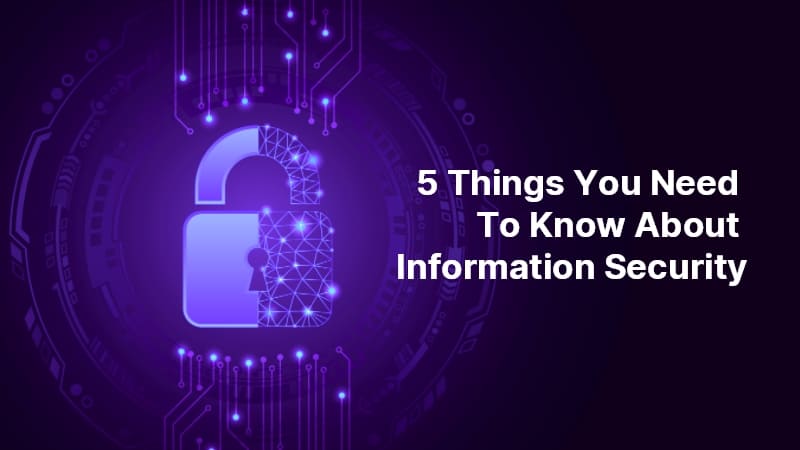
29 Apr Protecting Your Data: 5 Things You Need To Know About Information Security
In today’s digital age, information security is more important than ever. From personal data to sensitive business information, protecting your data from cyber threats is crucial. This guide will provide you with the basics of information security, including common threats and best practices for keeping your data safe.
Understand the types of cyber threats.
There are many types of cyber threats that can compromise your information security. Some of the most common include malware, phishing, ransomware, and social engineering attacks. Malware is malicious software that can infect your computer or device, while phishing involves tricking users into providing sensitive information. Ransomware is a type of malware that encrypts your data and demands payment for its release, and social engineering attacks involve manipulating individuals into divulging sensitive information. Understanding these threats is the first step in protecting your data.
In addition to these common cyber threats, there are also more advanced and sophisticated attacks, such as advanced persistent threats (APTs) and zero-day exploits. APTs are long-term, targeted attacks that are often carried out by nation-state actors or organized crime groups. Zero-day exploits are vulnerabilities in software or hardware that are unknown to the vendor and can be exploited by attackers. It’s important to stay informed about these types of threats and take proactive measures to protect your information security, such as using strong passwords, keeping software up-to-date, and using antivirus software.
Downtown Computer Services offers to enhance the security and protection of your company’s data!
Our computer specialists are ready to discuss with you the necessary data protection services you need.
Implement strong passwords and two-factor authentication.
One of the most basic and effective ways to protect your data is by implementing strong passwords and two-factor authentication. A strong password should be at least 12 characters long and include a mix of upper and lowercase letters, numbers, and symbols. Avoid using easily guessable information like your name or birthdate. Two-factor authentication adds an extra layer of security by requiring a second form of verification, such as a code sent to your phone, in addition to your password. This makes it much harder for hackers to gain access to your accounts, even if they do manage to obtain your password.
In today’s digital age, information security is more important than ever. Cyberattacks and data breaches can have devastating consequences for individuals and businesses alike. One of the most basic and effective ways to protect your data is by implementing strong passwords and two-factor authentication. A strong password should be at least 12 characters long and include a mix of upper and lowercase letters, numbers, and symbols. Avoid using easily guessable information like your name or birthdate. Two-factor authentication adds an extra layer of security by requiring a second form of verification, such as a code sent to your phone, in addition to your password. This makes it much harder for hackers to gain access to your accounts, even if they do manage to obtain your password. By taking these simple steps, you can significantly reduce your risk of becoming a victim of cybercrime.
Keep your software and systems up-to-date
Another important aspect of information security is keeping your software and systems up-to-date. This includes operating systems, antivirus software, and any other programs or applications you use. Updates often include security patches that address vulnerabilities and protect against new threats. Failure to update your software and systems can leave you vulnerable to cyberattacks and data breaches. Make sure to regularly check for updates and install them as soon as they become available.
In addition to updating your software and systems, it’s also critical to regularly back up your data. This ensures that if your system is compromised, you can still access your significant files and information. Consider using cloud storage or an external hard drive to back up your data regularly. It’s also a good idea to use strong passwords and two-factor authentication to protect your accounts and devices. By taking these steps, you can help ensure that your information remains secure and protected from cyber threats.
Use encryption to protect sensitive data.
Encryption is a powerful tool for protecting sensitive data from cyber threats. Encryption involves converting data into a code that can only be deciphered with a key or password. This means that even if a hacker gains access to your data, they won’t be able to read it without the key. There are many encryption tools available, including built-in options in some operating systems and third-party software. Make sure to encrypt any sensitive data, such as financial information or personal identification, to keep it safe from cyberattacks.
Encryption is a crucial aspect of information security, especially in today’s digital age, where cyber threats are becoming increasingly sophisticated. By encrypting sensitive data, you can ensure that it remains protected even if it falls into the wrong hands. This is particularly important for businesses that handle sensitive customer information, such as credit card details or medical records. Encryption can also be used to protect confidential business information, such as trade secrets or intellectual property. It’s influential to choose a strong encryption method and to keep your encryption keys secure to ensure maximum protection.
Train employees on information security best practices.
One of the most essential aspects of information security is ensuring that all employees are trained on best practices. This includes things like creating strong passwords, avoiding phishing scams, and properly handling sensitive data. Make sure to provide regular training sessions and keep employees up-to-date on the latest threats and security measures. Additionally, consider implementing policies and procedures to ensure that all employees are following best practices and taking necessary precautions to protect data.
Training employees on information security best practices is crucial in today’s digital age. With cyber threats becoming more sophisticated and frequent, it’s important to ensure that all employees are aware of the risks and how to prevent them. This includes creating strong passwords, avoiding clicking on suspicious links or emails, and properly handling sensitive data. Regular training sessions should be provided to keep employees up-to-date on the latest threats and security measures. Additionally, implementing policies and procedures can help ensure that all employees are following best practices and taking necessary precautions to protect data. By prioritizing employee training and education, businesses can significantly reduce the risk of a data breach or cyberattack.
Do you need to improve information security and effectively protect data?
Our computer security specialist is ready to audit the security of your IT system and provide measures to protect your computer. Call us right now: (954) 524 9002.
Check out the latest news:
- How Easy-to-Use Hacking Tools Are Fueling Cybercrime
- Cryptocurrency Security for Small Businesses: Protecting Your Wallet
- The Infostealer Epidemic: Protecting Your Business from the Latest Wave of Cyberattacks
- The Identity Crisis: How Compromised Credentials Can Cripple Your Business
- Beyond the Brick and Mortar: Building Your Online Storefront with Digital Marketing
